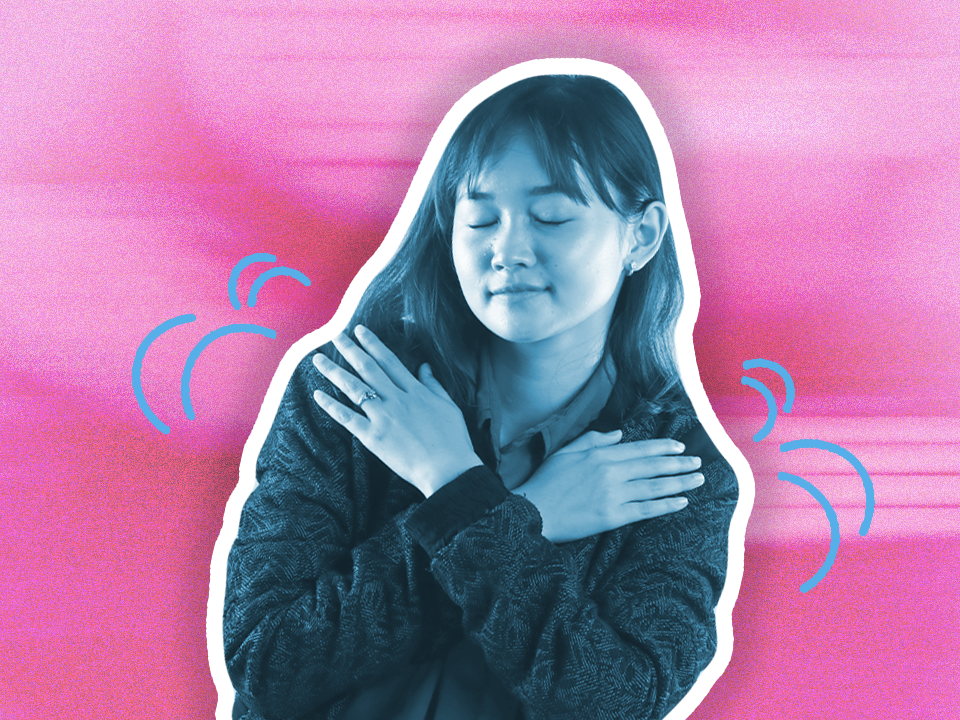What’s EFT Tapping and Why Is the Internet Obsessed With It?
Those TikToks aren’t telling you the full story.
If there’s one thing TikTok is great at, aside from keeping you up way too late, it’s putting you on to something you may have never heard about offline (remember learning about glimmers!?). Lately, you may have come across TikTokers documenting the benefits of tapping—basically, repeatedly tapping your fingers against parts of your body to calm down and (allegedly) even heal from trauma.
In one viral TikTok, a licensed therapist demonstrates a tapping routine and suggests that it’s a way to manage intense feelings, saying, “Tapping uses energy points, and it actually helps turn off the brain’s alarm system, so it’s great for stress or whatever feels bigger than you today.” An accessible way to take care of your mental health at any minute? Yeah, I’ll have that. Thx.
If you’re thinking, Isn’t healing and managing my emotions much more, um, complicated than this? Take a seat. We have a lot to discuss.
Whether you’re straight-up skeptical or willing to double tap yourself for the rest of time if it can bring much chill, here’s what licensed mental health pros and a Chinese Medicine expert are saying about the claims, the history behind this technique, and whether you should add a tapping ritual to your self-care toolkit.
OK, so what *is* tapping?
Commonly known as the Emotional Freedom Technique (aka EFT Tapping), tapping directs your attention to your body and claims to address mental and physical symptoms of anxiety, depression, or even post-traumatic stress disorder (PTSD). Think: rapid heart rate, low mood, fatigue, restlessness, and trouble concentrating. The end goal is ultimately to help you think more clearly about whatever’s bothering you, says Robin Bilazarian, LCSW, a psychotherapist who completed EFT training.
While an engineer named Gary Craig trademarked the Emotional Freedom Technique and is often credited with bringing EFT tapping to the masses in the ’90s, the origins of EFT are controversial. That’s partially because they pull from complex Chinese Medicine techniques and qigong (a somatic or body-focused practice) that are much more involved than the tapping bit. When Craig simplified and repackaged these techniques for Western audiences, some say he watered down the practice. That’s where you get the cultural appropriation accusations, says Rachel Oristano, DCSM, MSEd, who holds a doctorate in Chinese medicine, is a licensed acupuncturist, and is training to become a licensed therapist.
Does tapping work?
Tapping has many passionate supporters, but totally unbiased research is relatively limited, as you’ll notice in conflict of interest disclosures on many studies. A simple search will show you tons of papers claiming that tapping can help with a range of issues, like PMS and PTSD. But other researchers are less sold on the power of tapping, calling some results into question and saying additional research is needed. So, it’s hard to say for sure if tapping is clinically proven to do all the things people say it can do.
That said, here’s how it's supposed to work: Tapping involves using your fingers to gently touch and put pressure on Chinese Medicine acupressure points, which are areas of your body where energy that promotes overall health is thought to flow, says therapist and EFT practitioner Melissa Lester, LCSW. Lester also notes that acupressure has been used in Eastern cultures for thousands of years, with Western medicine recently catching on to the practice.
Because the research on tapping is limited and imperfect, looking to massage therapy research can sort of help explain the mechanics behind tapping, Dr. Oristano says. Through massage, feel-good chemicals like dopamine and serotonin are released in your brain, and stressy cortisol levels decrease, which signals to your body and mind that you can chill out, suggests one 2005 study on massage therapy.
Those effects on cortisol, dopamine, and serotonin can also signal to your amygdala (the part of your brain that deals with emotions and stress) that it can chill out a bit, says Bilazarin, which is great for getting you back to rational thinking.
When you’re able to send signals to your body that you’re safe (which tapping claims to do), you can positively influence how you respond to certain situations, which promotes lasting change in your brain and helps you make a habit of processing your emotions more effectively, Bilazarian says. That can look like thinking differently about a stressful situation, like deciding, Actually, I will not flip off that a-hole driver today and give them my energy, or realizing that some horrible thing that happened to you wasn’t actually your fault, Bilazarian says.
Tapping also involves mindfulness by letting go of external distractions and tuning into what you’re feeling in your body, which is a helpful mental health practice in general, says Lester. (After all, simply being aware of how life is messing with you is the first step to feeling better.) “If an individual is having a difficult time naming how they are feeling, EFT might be helpful in connecting with the body and releasing feelings like stress or anxiety,” says licensed clinical psychologist Nina Polyné, PsyD, who recommends tapping along with cognitive behavioral therapy (CBT) to clients who might feel “stuck” in feelings they “just can’t shake” or are dealing with significant everyday stressors.
When practiced by a Chinese Medicine expert, tapping can be paired with techniques like massaging the whole acupressure channel (rather than just pressing on one specific point) and cupping, Dr. Oristano explains. The expert might also warm the acupressure points through a practice called moxibustion, Dr. Oristano explains. When Chinese Medicine and qigong are used holistically in the way they were intended to be, the benefits are said to be more intense than just focusing on the tapping part of the technique, Dr. Oristano adds.
When practiced in the West, tapping is often combined with therapy, especially exposure therapy, which is supposed to be another way to help you deal with stress and improve your overall mental health. That said, you don’t have to pair tapping with any therapy appointments if that’s not something that’s available to you, but it’s definitely advised if you feel overwhelmed with tough emotions or are working through trauma.
Who should try tapping?
Some studies suggest that some people with certain mental health conditions, like anxiety, can benefit from tapping. In one (imperfect) 2019 study comparing tapping to progressive muscle relaxation, a stress-reduction technique, tapping was said to help participants manage anger and fear, which could help them with their anxiety. In a small 2013 study in which one of the authors had a conflict of interest, nearly 86% of veterans who received EFT were said to no longer meet PTSD criteria after six tapping sessions compared to just 4% of people on a waiting list for EFT treatment. And a 2016 systematic review of 20 studies (which included some potentially biased reports) suggests EFT was as effective or more effective than “treatment as usual” in helping people recover from depression symptoms.
But, just like those extreme fitness commercials say, if you have physical concerns or conditions, definitely talk to your doctor before trying this tapping stuff at home. And if you’re struggling with a mental health burden that’s causing you a lot of distress, or if you think some tough feelings might bubble up as you tap, it’s best to call in a licensed therapist or your primary doctor for reinforcements. “Having a supportive expert with you can be helpful so you can fully process what you’re experiencing,” says Dr. Polyné.
How to try tapping on your own.
Obviously, it would be best to work with a licensed therapist, a Chinese medicine physician, and/or your general practitioner who can explain all the ins and outs of tapping and acupressure and your unique medical history.
But if you’re using TikTok to test the tapping waters, Lester suggests looking out for someone who is a licensed therapist trained in tapping and/or a Chinese Medicine physician. When you find a video that you might want to follow along with, keep an eye out for potential red flags, like extreme claims that tapping can cure you of your mental health struggles. Dr. Oristano says.
One EFT-style tapping session usually involves gently tapping on 8 to 10 acupressure points, Lester says. Typically, those points would be the top of your head, inside of your eyebrows, the outside corners of your eyes, underneath your eyes, under the nose, on your chin, under your clavicle, the outsides of your hands, and at the top of your rib cage (if you wear a bra, it’s right around your bra line).
You can use as many fingers as you want to apply gentle pressure to these points, tapping 5 to 10 times on each until you feel calm. Bilazarian says one tapping session takes about 30 seconds, so you’ll likely end up spending just a few seconds on each point, which means you tap pretty quickly. “You can go in any order, and if you forget a point, it’s not a big deal,” says Lester. “If you get to a certain point and notice it’s helping you feel better, then you can stay on that point.”
Side note: If you work with a Chinese medicine expert, they can design customized tapping patterns for you depending on your concerns, which could mean more powerful benefits that you might otherwise miss out on by solely following along on TikTok or with EFT tapping, says Dr. Oristano.
Some TikToks show people tapping while saying some positive affirmations, which you can do, but it’s more important that you make real observations about how you feel in the moment. If you notice yourself calming down, Bilazarian recommends taking advantage of your clearer mind and thinking about the situation you were stressed about.
In general, if you’re working with a trained expert, there aren’t major side effects to tapping—Bilazarian says people frequently yawn or sigh during sessions, signs that they’re “moving from a state of fight, flight, or freeze to a state of relaxation.” It’s also totally normal to feel strong emotions welling up, and you may even start crying—all the more reason not to rely on a TikTok to walk you through it.
The bottom line: If you’re looking to stock up on more mental fitness tools that might help you clear your mind and refocus your energy, consider giving tapping a try. Just make sure you’re taking advice from licensed therapists and/or trained experts who can offer that holistic approach to Chinese medicine so you can get the full effect.
Wondermind does not provide medical advice, diagnosis, or treatment. Any information published on this website or by this brand is not intended as a replacement for medical advice. Always consult a qualified health or mental health professional with any questions or concerns about your mental health.




